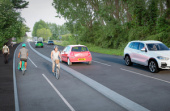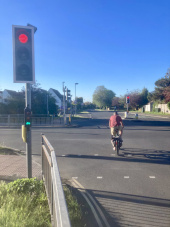Emergency Active Travel Fund Tranche 1: The WSCF position
This has been sent to all West Sussex County Councillors and relevant Officers at WSCC
SUMMARY
The WSCF deplores the decision by the Cabinet Member for Highways at WSCC to remove all but one of the 7 so called pop up cycle lanes. While acknowledging that the process was flawed, with very challenging deadlines, we believe that many of the problems were avoidable. Experience from Tranche 1 must not only inform delivery of Tranche 2, but also trigger a review of how all walking and cycling schemes are delivered in future.
The WSCF urges the Cabinet Member for Highways to reconsider the Shoreham scheme. Evidence is still emerging to support the view that this scheme meets the government’s aspiration “to deliver a lasting transformative change in how we make short journeys in our towns and cities." The Tranche 2 funding to enhance successful tranche 1 schemes should be used to ensure that it does.
The WSCF urges WSCC to rethink the relationship with districts and boroughs in the delivery of walking and cycling schemes. The flawed implementation of EATF schemes has undermined the work cycle forums are doing with districts and boroughs on Local Cycling and Walking Infrastructure Plans. There is a strong case that districts and boroughs are becoming much better placed to deliver walking and cycling schemes with much greater sensitivity to local needs. The challenge presented by Gear Change and design standards LTN1/20 must be tied into ownership and implementation of LCWIPs at district and borough level. The award of half WSCC’s bid for Tranche 2 funding places WSCC fourth from bottom of LAs when measuring Tranche 1 and Tranche 2 indicative awards against actual awards. There is ground to be made up so that we can all work together, in a significant, meaningful and substantial way: to set out a plan that will regain public acceptance of the social, health and economic benefits of active travel.
CLEAR AND COMMITTED LEADERSHIP.
We have not seen the leadership needed to take up the challenge from government that this was “a once in a generation opportunity to deliver a lasting transformative change in how we make short journeys in our towns and cities."
No attempt was made to build consensus around the need to build back better. As the government consistently advocated, this could have been done in a way that co-opted growing public support to address health and well-being, climate and air quality. As a result the whole process of decision-making, design, and communication has been bedevilled by a lack of clarity about outcomes. When assessed against the government’s stated objectives, the announcement to remove the Tranche 1 schemes makes no sense in either its rationale or timing. This approach must change in order to deliver Gear Change and the Design Standards LTN 1/20. A long-term, strategic commitment to walking and cycling is already emerging at district and borough level with the development and adoption of LCWIPs. Moreover, it is at this level that some cycle forums are already working with councils on the climate and health agendas.
COMMUNICATION.
Communication with the public was between non-existent and poor. Neither the Government’s rationale, nor the particular circumstances with regard to public consultation were set out. Worse, the communications, and in particular the public survey, worked to set people against each other by identifying as motorist, pedestrian, cyclist etc.
As a result, the public was unconvinced and remained with their opinion that it was imposed and done ‘for cyclists’. The effect has been to set the public’s mind against cyclists and cycling. This was particularly damaging at a time when districts boroughs are working on, and consulting on, LCWIPs. At district and borough level some cycle forums are already working with councils and in their communities to build consensus. The work done by Shoreham-by-Cycle has been used nationally to demonstrate this. Some of the communications from the county has undermined this work.
CONSULTATION.
While the timescales were challenging, the consultation could still have been wider and more effective.
Although public consultation was not possible, some cycle forums were offered an opportunity to comment on the designs – which they did. That consultation could have started earlier. In the event, few of the forums’ recommendations were taken up. It is also understood that specific requests from districts and boroughs about the choice of schemes in relation to LCWIP delivery were ignored. The WSCF recommends the model of Adur & Worthing Councils’ Walking & Cycling Action Group. The forum is open to broad community representation, councillors and council officials. It also has expert input on walking and cycling design. This group was able to provide rapid and informed feedback through on-line meetings. Even so, this group would have been much more efficient and effective if the designers and communications people had engaged directly in the on-line discussions. The cycle forums question how much notice was taken of the feedback provided.
DESIGN AND IMPLEMENTATION.
Overall, the schemes were not designed with sufficient attention to the needs of the people who had discovered, or re-discovered, their bicycles during the lockdown.
Design issues included significant safety concerns, as was clear from installation of the first scheme in Chichester. More generally, people on bikes were left vulnerable at junctions. These concerns should be have been apparent to the designers and should never have reached implementation in the form they did. Many cycle forums were placed in an impossible position of trying to find a way to support flawed designs. This was made worse because of the lack of clarity over outcomes; the lack of engagement with the designers; and the backlash exacerbated by the communications. In this context, it should not have been surprising that the schemes did not attract huge numbers of people who did not usually ride. Moreover, the message ‘use it or lose it’ was particularly inappropriate.
Going forward, LTN 1/20 requires that “all designers of cycle schemes must experience the roads as a cyclist”. The design-at-distance of the EATF schemes will not do. Some districts and boroughs are now working with expert transport consultancies, notably Transport Initiatives and Phil Jones Associates. Work on LCWIPs is developing local knowledge and establishing networks for consultation. The WSCF urges that much of the work to deliver Gear Change, LTN1/20, and LCWIPs is devolved to the level where local knowledge and expert input is already working constructively together.
DECISION MAKING
The decision to remove all but one of the schemes was premature, faint-hearted and short-sighted. It contradicts the Government’s further instructions to favour active travel. Spending £781,000 of taxpayer’s money with little of substance to show for it, can only be described as failure. It has justified in many people’s minds an opposition to any investment in cycling in our towns. The decision cannot have been fully informed by evidence. Some schemes had scarcely been completed; people had little time in which to change their travel habits; designers had no time to improve the schemes; there has been insufficient time to analyse data on road efficiency, journey times and air quality. The decision had little regard to the negative impact on the delivery of those schemes that are integral to the long-term plans set out in LCWIPs. Made right at the start of the second Covid-19 lockdown, with infection rates rising, the decision was completely insensitive to the needs of people using the schemes. The emphasis on numbers had not been defined in terms of what would constitute success. The ugly debate about numbers has side-lined the health and environmental benefits that were accruing from every trip made on foot or by bike. The WSCF believes that the Cabinet Member for Highways succumbed to public perception, backed by noisy pressure, rather than evidence. The public saw road space reallocated to cycle lanes; reduced road space for vehicles; and blamed that for the congestion which is always a feature of our towns. The WSCF believes that the emerging data does not indicate that congestion was significantly affected; nor pollution; nor journey times; nor collisions. Schemes could have been adapted to alleviate some of the issues that have arisen. The opportunity “to deliver a lasting transformative change in how we make short journeys in our towns and cities" has been missed. There is ground to be made up so that we can all work together, in a significant, meaningful and substantial way: to set out a plan that will regain public acceptance of the social, health and economic benefits of active travel.
- Log in to post comments




